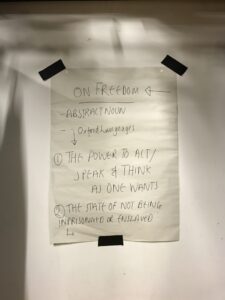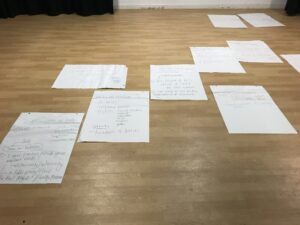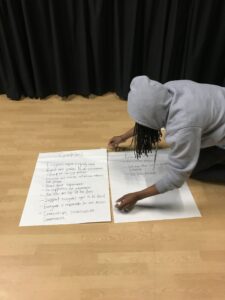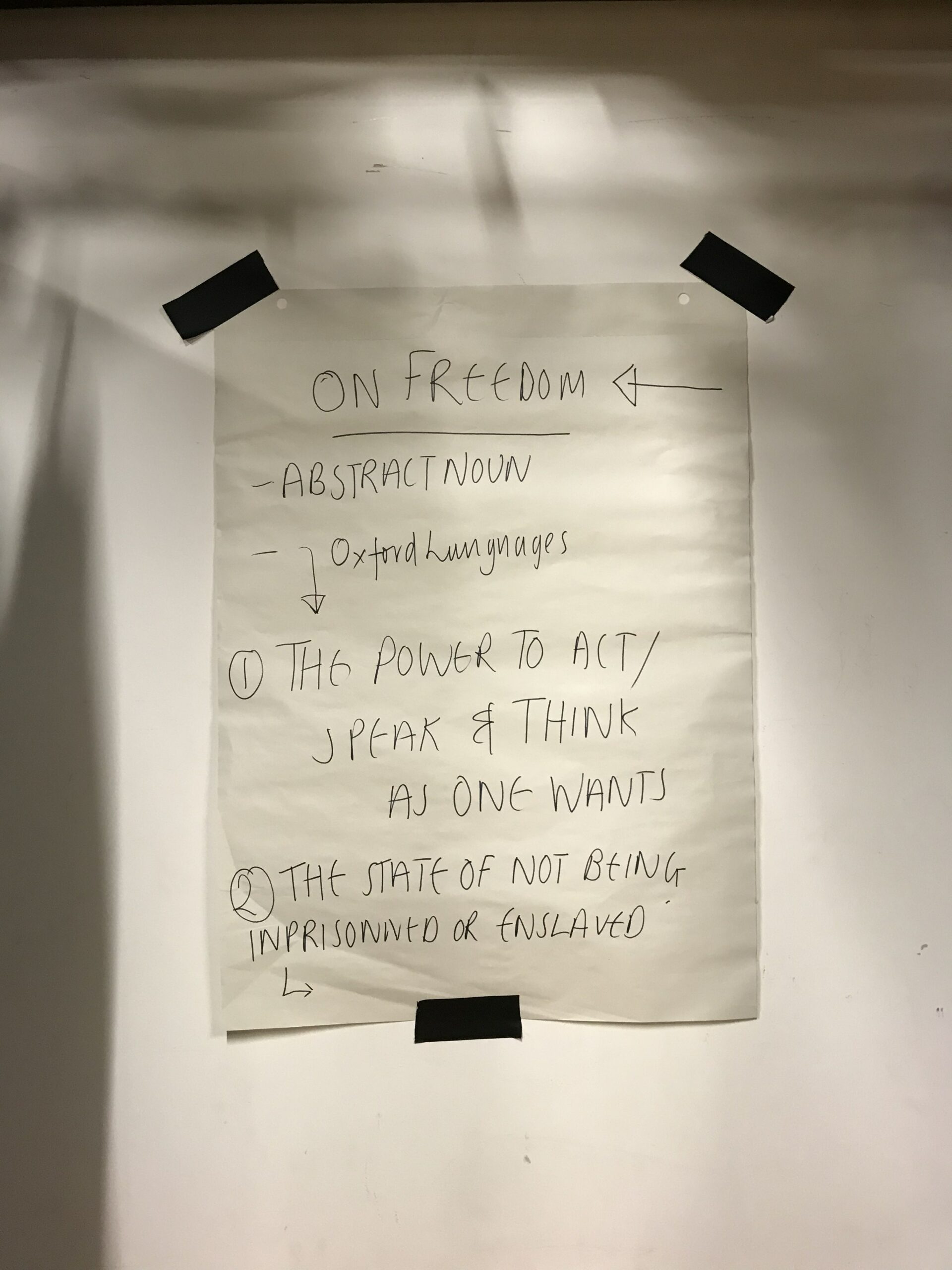What’s at stake in defining freedom? Dramaturging Project Freedom with Jamal Harewood
Lucy Tyler
On the second day of Jamal Harewood’s week-long residency in the studio of the Film, Theatre and Television Department, at the University of Reading, we start calling the work Jamal is developing ‘Project Freedom’. There were other title contenders -‘should Project Freedom be The Freedom Project’, for example? No – Project Freedom, we say, has an optimism. It’s what Jamal calls shitgood. What goes unsaid, but tacitly understood about Project Freedom its its nomenclature of black struggle: the rhetoric of freedom writers including Olaudah Equiano, Mary Prince, Phyllis Wheatley, and Ottobah Cugoana, the speeches of Martin Luther King Jr., Malcolm X, Fannie Lou Hamer, Patrisse Kahn-Cullors, the writing of Lorraine Hansberry, James Baldwin, Ibram X Kendi, Renni Eddo-Lodge, and, more locally, in Reading, the community actions documenting some of the above in a 36 meter-long mural by Alan Howard, in the late twentieth century. Between Jamal and I, though, this etymology is unstated. Maybe it’s because we’ve been talking for some time, maybe it’s because I’m a dramaturg whose whiteness situates me outside this. Maybe it’s because this history isn’t central to the structural development of the work we’re undertaking this week (and yet it is the framework in which we work). Either way, Project Freedom has something of what Selina Thompon evocatively describes as ‘time accumul[ating]’ in Salt.
This is because Jamal has in mind a culmination; his idea for a trypic examination of the concept of freedom in three acts. This involves Jamal creating: 1) an interactive audience workshop in which the audience define according to their own self-determination ‘freedom’; 2) a later installation to archive and showcase the differentiating definitions; and 3) a much later performance – based on the above. The models of practice that Jamal notes include Thompson’s Race Cards, and a detailed reflection on his own oeuvre including The Privileged. What’s strikingly different about Project Freedom from The Privileged, however, is Jamal’s own positionality. In The Privileged, Jamal (to quote Sharon Olds) ‘la[y] down […] slowly alone at the centre of a circle’, wearing a bear costume, in order that a predominantly white audience might decide his fate in the ‘inclosure’. In Project Freedom, there will be a circle of participants too. And in this circle, participants will collaborate to define freedom. To coin Katherine McKittrick, what is at stake here? What is at stake in this very particular space of realising discourses of freedom with Jamal? And, perhaps more specifically, what is being given voice inside this particularly loaded linguistic experiment – especially in the field of what Sara Ahmed has referred to as the ‘ongoing and unfinished history of whiteness’ in universities such as UoR?
In the university theatre studio, then, in January 2022, amongst our sharpies, our falafel wrappers, our bubble tea and face masks and mocha cups, Jamal’s at the beginning of this: designing the Project Freedom workshop and testing it out for the first time, and then a second, over the week. Since Jamal and I have written about and discussed the chronology of the residency elsewhere, the purpose of this account is really to document what happened at the test case workshops that week – from standpoint. It is worth noting that everything I have written and said publicly about this has been read, edited, clarified and discussed with Jamal.
From my perspective, there seems to be three elements that Jamal is blending into the workshop, which are worth noting straight off: 1) his own experiential epistemology regarding the producing of participatory practice (for majority white audiences); 2) his wider-reading on workshop facilitation; and 3) our shared engagement with processes of decolonising theatre practice on the Work in Progress project.
Jamal outlines his experiences of ‘facilitation’ in The Privileged – where he played the silent host, a ‘bear’, with an audience following predetermined, written instructions (see Lisa Wornarski on this here). Across snippets of chat on The Privileged, including a generous post mortem on it with two MA students, I get an insight into the development of Jamal’s ideas here. Jamal did not want to make a performance that explored race (let’s sit with that for a minute). He discusses various iterations in which he attempted to make developmental changes that undermined these politics in performance including his, and the audiences’, embodied presence by turning off the lights, blindfolds (something we discuss in relation to Project Freedom), and an anger at an artistic culture in which he felt coerced into exploring themes of race. Jamal articulates a moment in the development of The Privileged when the show became a direct ‘fuck you’ to that culture – where he, in an act of détournement, appropriates the theatre culture’s interpellation. His methodology became one of ‘so you want me to explore black male stereotype, so you want me to explore racialised constructions – here you fucking go’. Jamal’s conceptualisation of making a performance that tests the boundaries of his own consent manifested strongly in the Abramović-esque handing over of the self in performance. Semi-ironically (and yet not at all), to allow the predominantly white audiences to safely decompress from this direct confrontation with their supremacy, Jamal added a theatre-club-esque discussion for audiences while he cleaned KFC off the floor. This act of resetting, he says, was his own practice for decompressing. The takeaway from this reflection on Jamal’s positionality in The Privileged is this: as noted above, in Project Freedom Jamal is intending to adopt a very different presence in the space, in his facilitating open discussions on freedom. At the same time, there is obviously an inescapability of our bodies’ sign systems, how they mean in theatre space, that produces racialised dimensions. There is also, I suspect, a continuation in Jamal’s rightly critical reading of cultural whiteness – and his provocative facilitation of experiences that engage it – being carried through.
The practice of this facilitation – and how to develop an appropriate style for it for Project Freedom – is central, therefore, to Jamal’s process. How to facilitate a group of people – whose identities, whose bodies mean and thus accumulate history – in defining freedom? At the beginning of the residency, Jamal is in the process of reading some literature on the practice of facilitation. He identifies the positionality he wants to adopt in relation to the participants. This encircles a radical pedagogical position of Jamal’s facilitating the participants in a way in which he is learning from them. He talks of Rancière’s ignorant school-master as a model and it is this kind of reflexivity – this kind of total (and yet pseudo) handing over – that interests him as a working method.
The other model of practice informing Jamal’s aims here is that of our shared history of facilitating and attending workshops around decolonising theatre – as part of the Work in Progress project. In the early development of The Acquisitions Panel (2022), by Fast Familiar, for example, a work commissioned by Work in Progress that explores the politics and processes of decolonising museums, we experience a model of facilitation Jamal is interested in developing. The Acquisitions Panel, like Jamal’s work – is an interactive piece which asks the audience to take up the role of a museum’s panel determining whether to acquire a colonial object. The development of this work is discussed elsewhere. It involved a wider process of facilitating conversations about decolonising museums between Fast Familiar and MERL (Museum of English Rural Life), but also the wider project initiated by Fast Familiar on the possibilities of decolonising their company and its artistic processes. In order to explore this process and methodology, Jamal, Lisa and I attended a workshop facilitated by Fast Familiar at South Street Arts Centre in February 2020. The opening act of the workshop comprised a collective task in which we would design the rules for collaborating throughout the day. This was interwoven with conversations on decolonising that took into account our own subjective positions, limitations and awareness of colonial processes. These themes were deeply embedded into the activity, but it was the process of self-determining the rules of the workshop, interspersed with repeated reference to and recognition of whiteness, that could be taken forward by Jamal in Project Freedom.
Jamal’s method thus aims to produce a gentle and supportive atmosphere, which is non-hierarchical, promotes free speech and allows participants to meet freely on equal terms. His main aim is that he does not want any participant to defer to him; there is an emphasis on self-determination here – an attempt to cultivate the audiences’ freedom as part of the experience itself. We’re at a university, yes, but we’re attempting to meet in this space without allusion to the line-up. Is this possible? What will bring us together? There is also, here, I reckon, an aesthetics of what Andy Smith usefully calls ‘dematerialised theatre’. We’re in a studio, yes, but there’s no theatre systems in play. Jamal’s resistance to theatre systems, combined with his aim of upholding the self-determination of the group as a guiding principle, are the central methodologies that enable participants to strip back the formality and come together. But what if no-one mentions Jim Crow? What if no-one talks about modern day slavery? I wonder aloud. ‘It doesn’t matter’, is what Jamal thinks; it’s for the group to decide what freedom is constituted and historicised by.
The residency is a structured one. On the Monday, Jamal and I meet, decide to raid the prop store for a good ‘thinking chair’ for Jamal, get used to being in the freezing studio (‘necessarily so, apparently, because of COVID ventilation), drink coffee, work together in the morning to brainstorm conceptual ideas around freedom, using large pieces of paper and the sharpies Jamal has brought with him. We talk abstractly about different types of freedom and different lenses that we anticipate audiences would bring to the workshop – especially in relation to Jamal’s wider plans of an Action Hero-esque tour to different regions and contexts to collate divergent definitions. I act as scribe, write down a lot of what Jamal says, including – on a separate piece of paper – the definition of freedom which we find from an online dictionary.

This definition, written by me on the piece of paper, becomes a key feature of the workshop later. We use tape to stick the definition on the white wall of the studio.
Before the participants enter, we close the blacks over the definition, ready for Jamal to reveal it later. This revelation is exciting and hilarious to us. We anticipate its effect – a small act of theatre in the workshop setting. And so we laugh as we work, often talking about other things, telling jokes, always returning to task. Later in the morning, xxx joins us for some dedicated work with Jamal on structuring the workshop. The following day, Tuesday, Jamal and I work together on organising these ideas, then meet up with some further collaborators: Jannah and Ajoké – who will document the workshops and the definitions of freedom that are being created.


Central to Jamal’s long-term aims for Project Freedom is to collate the audience’s documentation of their definition of freedom. This aim deserves, perhaps more discussion than I have given it here since Jamal and I spent a long time talking about it as central to the project. The workshops will thus act as the basis for a future installation using this material generated in the workshop. It is not just for Jamal’s installation, though, that there is an urgency to document the workshops. Jamal is keen to provide participants with takeaways – their own dictionary definitions of – and pledges to – freedom. In order to facilitate this at the University, I applied via a scheme entitled ‘Real Jobs’, run by the Dept of Typography to work with two students to develop Jamal’s aims relating to documenting the workshop. On Tuesday, Jamal and I meet with Jannah and Ajoké and discuss what their task might be: to document the workshop by whatever means feels most suitable to them (on their laptops, using pen and paper, via photography etc.). Jamal is keen to limit the direct recording of the workshop for a key reason. At another University, when he performed The Privileged, it was recorded and he felt aware of the behaviours of participants being altered toward the less spontaneous, the less free. There is something about videographic documentation that strikes Jamal as contradictory to the self-determined and full-disclosure tone and register of Project Freedom. There is something here about Jamal’s defence of liveness, ephemeral practice, combined with a form of documentation that evades recorded footage. It is important to Jamal that the visible team for Project Freedom are people of colour – especially since the majority of participants, as noted above, are, in this context, white.
The Workshop
The first workshop, on Wednesday afternoon, is intended to be a small one, with six participants, including Jannah and Ajoké who document the work, two theatre and performance academics (Lisa Woynarski and myself) and two MA theatre and performance students. The workshop is divided into five sections, or interactive activities, with the experience intended to last around 1.5 hours, maybe slightly less, maybe slightly more. Jamal and I have worked together on Tuesday morning to confirm the activities and their order, using post-it notes to demarcate the structure, acting as memory aids for Jamal in the workshop itself.
Jamal welcomes us into the space, and asks us to put our bags to one side, take a black chair, and form a circle. He also takes a chair and joins us. He starts by saying something like ‘welcome to the workshop – it’s about freedom and you will get the chance to define freedom in whatever way you choose’. We nod appreciatively.
The first workshop activity is this: a chair-switching game using the prompt of ‘the sun shines on anyone who…’. Jamal relays the rules: if you are prompted by agreeing with the statement, you move to another seat (which cannot be next to yours), if you are the last one standing, you make the next ‘the sun shines’ statement. In preparing this activity, Jamal is
keen to create a dynamic that escalates the stakes. We start with clothes and appearance and move toward feelings, then toward ideology and morals. For example, we start with a participant standing in the centre of the circle and saying: ‘the sun shines on everyone who is wearing white trainers’. Those with white trainers move between chairs. The sun shines on anyone who is wearing denim. The sun shines on anyone who is wearing grey. It’s fun. We laugh and are playful – to a certain extent. It’s interesting perhaps to note, however, that we avoid the potentially offensive and racialised; there is no ‘the sun shines on anyone who is wearing glasses’, or ‘the sun shines on anyone who is white’ etc. We move to towards feelings. The sun shines on anyone who is happy today. The sun shines on anyone who is stressed today. The sun shines on anyone who has been hurt by a friend who they perceive did not adequately celebrate their successes. We move to ideologies. The sun shines on anyone who thinks people who commit crimes should go to prison. There is some shuffling in the seats now, some difficultly
making snap decisions. We come closer to feeling the threshold of our positions on the subject at hand.
Game two is one in which we are told of the locations of four positions on a spectrum: Agree, Slightly Agree, Slightly Disagree, Disagree. Each question Jamal asks us concerns freedom. Here is an example of one question: ‘my British passport makes me free’. We think for a moment, then participants relocate to the position they subscribe to. It’s important to note that Jamal asks us if we would like to discuss any of our answers and where we’ve positioned ourselves. Here is what some of us say in response to the question on passports. It is interesting to note that rather than abstractions, everyone cites their own experiences as justification for their position. There are those of us who do not have British passports, those of us with lived experience of moving effortlessly through different countries because of their UK passports, others with dual citizenship who have the benefit of comparative experiences that materially reveal
the hypocritically superior status of the UK passport. I think again of Salt and Thompson’s descriptions of the status of her British passport – often working antagonistically with her body in border spaces. There are theatrical mirrors here, in the residues of these questions, which are important. The game, then, moves us closer, and closer, toward an intimate examination of the lexicon of freedom. We have become more confessional, have more solidarity as a group and, have, I think, become compassionate about holding the space. This level of discursive interconnectivity is important for the next stage of the workshop.
Jamal asks us to return to a circle formation in the middle of the space. We are reflective now, interested and ready to talk. The third action is this: Jamal gives us a chunk of lined postcards each, and places a takeaway box of sharpies in front of us. We’re going to do some free sentence construction around two prompts. The first is ‘I feel free when’ and the second is ‘freedom is’. We are free to write what we want, as long as we number our cards (1) and (2) to demarcate which statement we’re responding to. We work independently now, choosing our sharpie colour, working on our individual cards. Some of us plod through, some zoom through reels, spilling them around ourselves on the floor. Jamal asks us if we would like more time. Some would. We continue for a bit longer. Then, Jamal stops us, asks us to find a way to discuss what we have written and, crucially, try to find a way to order or collect ‘themes’ around our ideas.
We work in no particular order reading to each other what we have written. Most of us have been what I’m going to call abstractly confessional. There is nothing specific, but almost everyone has defined freedom personally. We have statements read out such as ‘I feel free when I have no responsibilities’; ‘I feel free when I’m dancing with friends’; ‘freedom is a quiet night at home with no plans’ etc. Some of us have attempted to do rather worthier definitions: things like ‘freedom is defending civic possibility for all participants’, but we admit that these definitions were undertaken because we felt we had to come up with something generalised or useful. We largely dispense with anything that isn’t universal to our group. We are pleased with our collection of cards and the connections they have made between us.
Jamal tells us that we are now moving toward the next stage of the workshop where we’re going to think through, or discuss in any group formation, definitions of freedom. This is perhaps the most ‘theatrical’ moment of the workshop where Jamal reveals the definition on the wall. There is a murmur of appreciation from participants as we read aloud. Since there are two elements to the definition, we read both in turn, appraise and critique, offer our thoughts on
how comprehensive this definition is. Do we like it? Is it a definition that we would collaborate on writing together? Is this a definition that we would come to alone? This is the next task. Jamal gives us a large piece of paper and a box of differently coloured sharpies. Our task now is to make a collective definition of freedom – in a concentrated amount of time. Here are my observations on that process. We immediately note the difficulty in defining freedom: how slippery the term is, how there is only an allusion to other synonyms, but no referent we can grasp exactly. We then realise the significance in shaping a definition; is a single definition exclusionary. We are very wary of making space for the interpretation of far-right liberalism in our definition. At this stage, Jamal does not join in with the conversation and stands far back from the group. The proxemics of this are interesting. His silence and absence from the group adds a dimension of pressure, of judgement. He ‘puts a clock on it’ – tells us he is timing us. Do we have to include reference to the history of oppression in the definition of freedom, do we have to include an understanding of contemporary conditions of marginalisation, salvery etc. Is the definition for legal purposes, is it a global definition or specific to a particular time and place? Even the choice of colour of the pen in which we write the definition seems significant. What is interesting throughout is that there are no disagreements, no challenges to the line of movement, an ongoing discomfort of attempt to include the silent Jamal stood outside the circle. The shift and change in Jamal’s register in this moment feels like a performative mechanism that signals the significance of our decision and the racialised imperatives of it. Eventually, we make a definition: for us, ‘freedom is the possibility of self-determination in a way that does not impact negatively on others’. We’re all happy about it, a little infantilized by our pleasure in completing the task.
Jamal is not yet finished with us. Giving us another, shorter deadline, he asks that we move toward the final act: making a pledge to our definition – how we might honour it. We find this pledge-making harder to accomplish than the definition itself. Eventually we come up with a kind of mantra-pledge ‘we will honour the self-determination of others and ensure it does not impact negatively on others’. We are less pleased with our pledge, but, again, infantilized by our pleasure in completing the task. Why is the pledge so hard? What is hard about making a sentence to uphold the principles of freedom for yourself and others? Perhaps this difficulty is central to Jamal’s aim – his silent presence in these moments exacerbating this. When Jamal sits back down with us after we’re finishes he jokingly says ‘I hated you so much when you’re doing that!’ We all laugh, but I cannot help but think that there is some provocation around whiteness here at the centre of it all too.
In the week following the residency, I attend a roundtable discussion at the University of Oxford on Black British Theatre in England today. I have Jamal’s residency in mind. There are notable contributions from practitioners including Winsome Pinnock, and scholars including Lynette Goddard, the expected absence of debbie tucker green. Jamal’s practice feels relevant to this discussion, but distinct from its terms. This is not simply because of the divide between performance/text with Jamal’s work on the former, but perhaps because Jamal’s engagement with whiteness is so much more angry, targeted, necessary, mollifying, thrilling. There is a freedom somewhere in acknowledging this.

